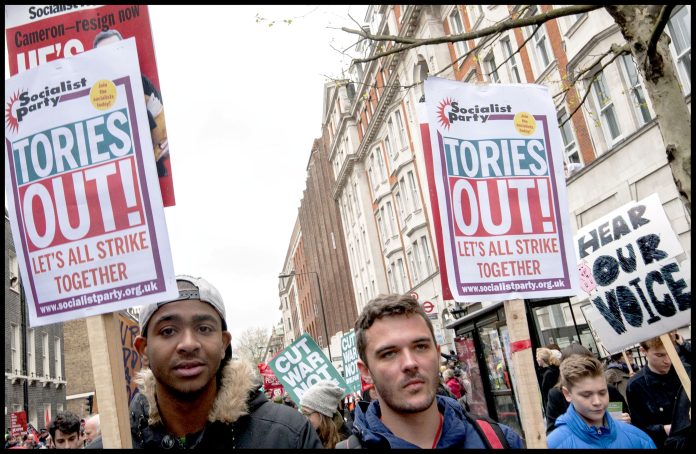Sarah Sachs-Eldridge, Socialist Party national organiser
As if we needed it, this year’s Tory leadership contest comprehensively confirmed the things we already knew: the Tories are deeply split and utterly bereft of solutions to the cost-of-living crisis.
The third TV debate was cancelled in an effort to stem the public ‘blue-on-blue’ blitz of candidates tearing chunks out of each other. Tax cuts, an offer largely aimed at the Tory MPs and party members who make up the contest’s constituencies, have been more a bone of contention than the ‘red meat’ they were intended to be.
Sunak, chancellor of and for the Rich List, was attacked as a ‘socialist’ by Liz Truss supporter Jacob Rees-Mogg over his March plans to raise national insurance. He has hit back calling Truss’s £34 billion in tax cuts ‘socialism’ and comparing Penny Mordaunt’s economic approach to Jeremy Corbyn!
But unlike Jeremy’s policies or ‘socialism’, their proposals do nothing to address the growing ambulance queues outside hospitals or the growing numbers of empty-stomached children populating classrooms.
‘Levelling up’ sham
Johnson was elected in 2019 on a programme which promised investment in the NHS and ‘levelling up’. Neither was achieved, and neither feature in the programmes on offer. Tory tax cuts are definitely not the answer.
Truss proposes to cancel a planned 6p rise in corporation tax worth £17 billion a year and abolish a £12 billion increase in national insurance contributions. She also promised to lift the green energy levy on bills, saying: “We immediately need to start putting money back into people’s pockets.” But the lie to this is given when she and the other contenders all rule out inflation-proofed public sector pay rises. Coordinating the many planned strikes is the necessary response to the new leader, whoever they are.
Sunak proposes tax cuts too, but only once he has ‘dealt with’ inflation using savage austerity. His Spring Budget pencilled in tax cuts to coincide with when he expects the general election to take place.
Big business benefits
Their argument generally goes that big business-benefiting tax cuts will kick-start the ailing economy. While big business would certainly be the main beneficiary, even their representatives deny it will change the downward economic direction. One business leader dismissed the proposals as “fantasy economics”.
These comments reflect the dire condition of the British economy. Fears of recession abound. Debt – government, corporate and personal – is spiralling. According to the Office for National Statistics, UK private business investment is more than a third down on pre-Brexit levels. And it was low then.
It is not a lack of funds that prevents big business from investing and creating jobs. For example, in 2019 the FTSE 100 companies paid a record £110 billion in dividends to shareholders, double a decade previously. But business investment fell that year.
The system the Tories exist to defend, capitalism, is not driven by what is socially useful, in developing technology or scientific understanding, but by where the biggest profits can be made. In a rational society there would be plenty of reasons to invest – this summer’s hot weather makes clear the urgency of creating clean, green energy and industry, as just one example of many.
For the capitalists in Britain it has become entirely logical in recent decades to focus on financial speculation rather than investing in production, because that is where the greater profits are to be made. This is a major factor in the current economic crisis – and the Tory contenders have nothing to offer, hence the bickering over tax cuts today or tax cuts tomorrow.
Meanwhile, polls show support for nationalising the energy companies growing. But that is not on offer from the Tories or from any Westminster party.
Pro-capitalist Labour
Hatred of the Tories, regardless of which one wins the leadership, may mean in the future Sir Keir Starmer’s Labour finds itself in government. But under Starmer, Labour has ditched the entirety of Corbyn’s manifesto, including nationalisation. He said: “We’re starting from scratch. The slate is wiped clean.” That slate is now being marked with pro-capitalist policies. A future Labour government that defends capitalism will also fail to offer a way out of inflation-austerity misery for millions of working-class families and will also find itself in crisis. The working class needs a mass party that acts in our interests with a socialist programme. None exists – it must be built, and working-class people moving into struggle through strike action are increasingly drawing that conclusion.







